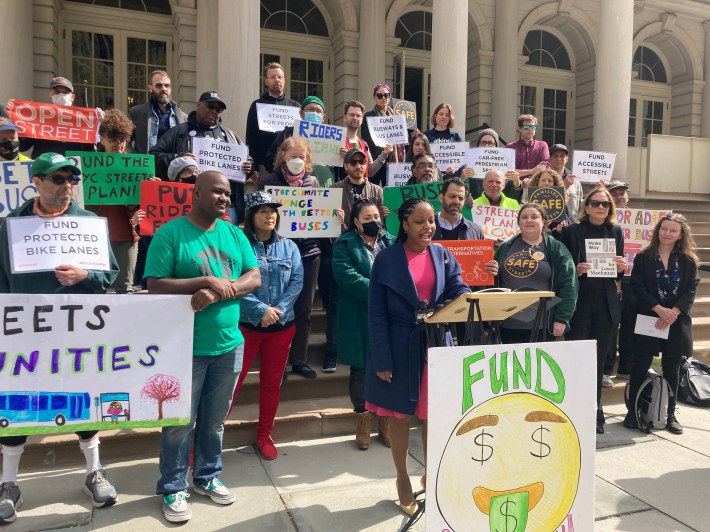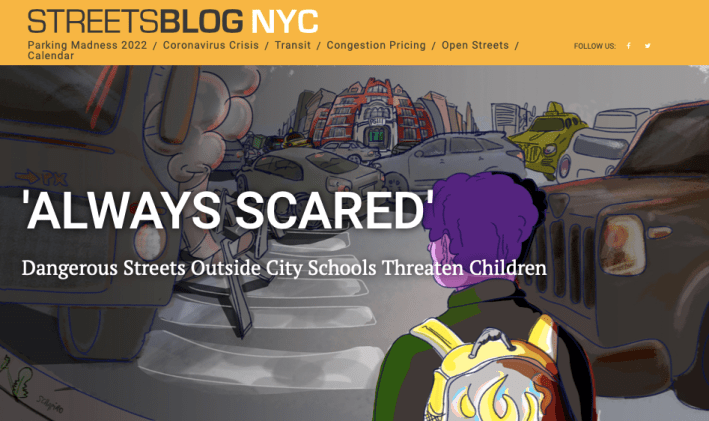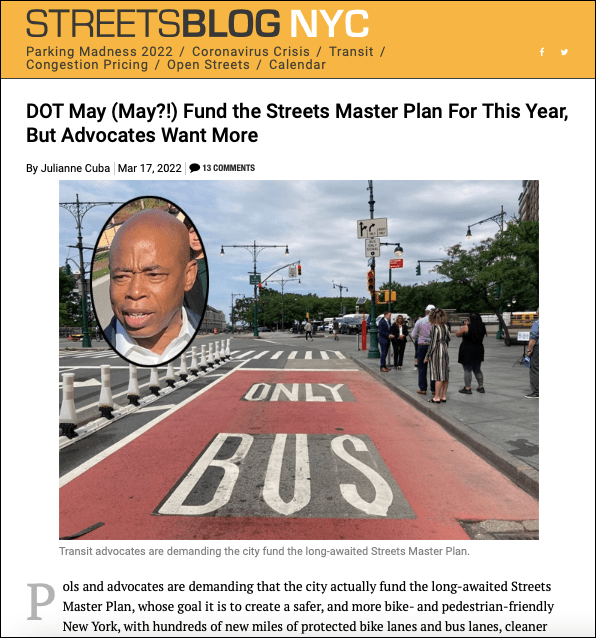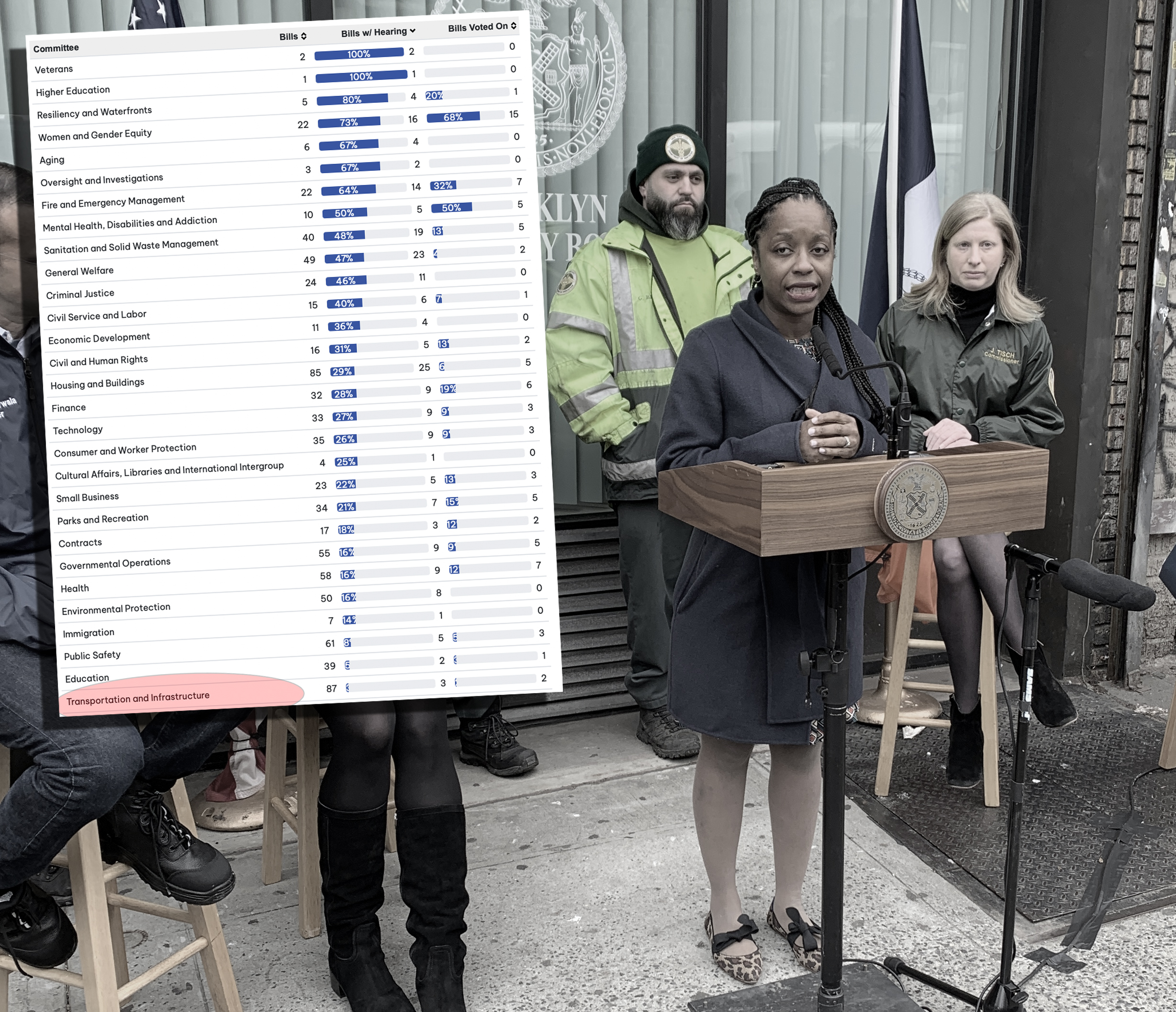The City Council's Committee on Transportation and Infrastructure lagged behind nearly every other committee when it came to passing legislation and holding hearings on bills in 2022 — revealing a decline in accountability and productivity compared to previous leadership, according to advocates, insiders and a review of city data.
In 2022, the committee held just three hearings on 87 bills, or 3 percent, and voted on just two of them, according to the new Council tracking website Intro.nyc — created by software engineer and data analyst Jehiah Czebotar.
By comparison, under previous chairman then-Council Member Ydanis Rodriguez, the committee (then simply the Committee on Transportation) held hearings for 108, or 35 percent, of its 310 bills during the legislative session from 2018 through 2021.
Certainly, by that point, Rodriguez was a veteran lawmaker, especially compared to the vast majority of the 2022 Council. Nonetheless, other committees on the rookie Council have held far more hearings and passed more legislation:
- The Committee on Housing and Buildings last year, for example held 25 hearings on its 85 bills, or 39 percent, according to the data. That's not a huge drop-off in hearings from the previous four years, when it held hearings on 57 percent of its 314 bills.
- The General Welfare Committee had 49 bills on its docket, and managed to hold hearings on 47 percent of them.
- Sanitation and Solid Waste Management had 40 bills and held hearings on 48 percent of them.
And the Transportation Committee is also falling behind on the number of bills it passed last year — just two: one to study installing public bathrooms across the city and another to create a greenway master plan (though that passed with a caveat that the actual plan won’t be revealed until the end of 2024, which was watered down by the committee from the original July 1, 2023 deadline).
By comparison, the Transportation Committee's previous incarnation passed 11 bills in 2021, 10 in 2020, and 22 in 2019. Even in Rodriguez's first year as chair of the committee in 2014, the panel passed 17 bills.
And in 2022, the 14-member committee held 10 oversight hearings, some jointly with other committees, including hearings on safety in the subway system; on sinkholes, flooding and heatwaves; on laying the foundation for federal infrastructure funding; on the 10th anniversary of Superstorm Sandy; on the Taxi and Limousine Commission's regulated industries; and on transportation equity. The others were on budget negotiations, according to city records.
Comparatively, the committee under Rodriguez held 12 in 2021 and 11 in 2019. In 2014, during his first year, it held seven.
Experts and Council-watchers were aware of the Transportation Committee's numerical shortcomings long before the new data tool emerged this week.
“This transportation committee is night and day from the last one — and that's on purpose,” said a person familiar with the council under the previous administration. "I think [its approach] was kind of a ‘fuck you’ to the members and the advocates of the last administration who deeply cared about these issues."
According to the insider, the council last go-around, under leadership from then Speaker Corey Johnson and Rodriguez, made too much progress on issues related to street safety — passing legislation to launch the Opens Streets and Open Restaurants programs, passing the Streets Master Plan, and openly seeking to, as Johnson once famously put it, break the city’s car culture.
The current Council leadership under Speaker Adrienne Adams and Transportation Committee Chair Selvena Brooks-Powers, both of whom represent districts in Eastern Queens, is taking an obvious different route.
“You can hear it if you look at the debates on some of the legislation in the prior council, some of the members they felt like communities that rely on cars were being pushed aside and not listened to; there were a number of council members that did not subscribe to the believe that car culture is bad for the city,” the insider said. “That community is very loud, it's very vocal and my guess is in Selvena and Adrienne’s districts, they hear most often from people who are pissed off about parking spaces being taken away.”
Late in the year, Brooks-Powers tweeted her list of accomplishments:
This year, we had many highs & lows. The end of the year was difficult but we are blessed to have made it this far. One things for sure, two things for certain we was working! I am excited to enter into the new year determined to continue delivering for my district. #HappyNewYear pic.twitter.com/Ff0yaUd0nR
— CMSelvenaBrooksPowers (@CMBrooksPowers) December 31, 2022
So who's in charge?
When Streetsblog first spoke with Council Member Selvena Brooks-Powers last January, the novice pol said she would start off her first term by visiting her colleagues’ districts, as well as talking to transportation advocates and experts, to hear their priorities for their own communities, and chart the best path forward for ending traffic violence and easing congestion.
And nearly 365 days later, she certainly has kept one part of that promise, so far visiting 31 of her 50 colleagues’ districts, from Council Member Alexa Avilés’s in Red Hook, to Council Member Ari Kagan's in Coney Island, to Council Member Eric Dinowitz’s in Riverdale.
But when it comes to pushing forward crucial legislation or holding the Adams Administration accountable, she is in no such rush; according to advocates, her committee was absent from many big-ticket issues of 2022:
- It accepted billions less in funding for street safety programs than it had demanded from the Adams administration (and then didn't engage in tracking where the $904 million is going).
- It remained silent on placard abuse and on the chaos that the placard class inflicts on city streets.
- It did not demand reform after school streets were shown to be particularly dangerous.
- It sat on the sidelines as e-mobility devices have proliferated — a change that advocates and experts regard as positive, but one that will require planning.
- It went AWOL on the Adams administration's supposed crackdown on ghost plates that have been involved in traffic violence and other crimes.
- It never took up the issue of the NYPD's pullback from enforcement.
Most important, the committee has not issued any statement or ordered up a hearing regarding the biggest transportation failure of the Adams administration: the fact that the DOT did not hit its benchmarks for installing new protected bus and bike lanes as part of the Council-mandated Streets Plan and has told the MTA and City Hall that it won't make them next year, either.
During her first few months in office and as chair, Brooks-Powers did discuss tackling the surge in traffic violence on city streets, especially in her own district — where last year, 1,156 people were injured and six people were killed in 2,181 reported crashes, according to city data via Crash Mapper. That's roughly six crashes per day. Brooks-Powers's District 31 was and remains one of the most dangerous districts based on the number of injuries and crashes that occur there.
She started her first hearing on March 7, an oversight hearing on transportation equity, with an opening statement about the importance of equitable investment across the city, including in districts like her own:
All New Yorkers suffer when our streets aren’t safe, and no Council district is immune from the impacts of traffic deaths. But because of a lack of historical focus or investment from the city, districts like mine … more of our friends and families are hit and killed on our streets and sidewalks. The same situation holds true in other districts, from the Bronx to Staten Island. And these disproportionate effects aren’t limited to issues of safety, as the data shows that the same holds true when it comes to traffic pollution and lack of accessible infrastructure and other problems.
She added that it was just the start of many more similar conversations.
“This hearing is only the first step in an ongoing conversation around transportation equity,” said Brooks-Powers, whose family car was nabbed 19 times for speeding in school zones in the last year alone. Brooks-Powers vowed to slow down last April, after Streetsblog reported at the time that she had already racked up 17 such tickets over a one year period. But she didn't, and her lead foot has since been reported in the Post and Gothamist.
The record
Since that early March hearing, however, the committee has not held any others specifically related to transportation equity or street safety, or even Vision Zero, according to advocates and a review of scheduled hearings. City stats show that 256 people died on New York roads last year and 49,134 people were injured in 102,913 reported crashes, or more than 280 crashes every day.
And not yet on the agenda for this new year are a slew of proposals that would make streets safer, such as a bill that would prohibit any city agency from issuing parking permits to private vehicles that do not have an elected official license plate, or a bill that would create a more streamlined process to inform community boards of any street project, or a bill that would require the DOT to consider installing additional pedestrian signal safety features at certain crossings, or a bill to expand open streets during designated holidays, or a bill that would require the DOT to set a 5 mile per hour speed limit on open streets.
One highly touted bill — Brooklyn Council Member Lincoln Restler’s Intro 501, which would create a new $175 ticket for drivers who block bicycle lanes, bus lanes, sidewalks, crosswalks, or fire hydrants and award civilians who spot the infraction 25 percent of the resulting ticket — has been languishing in Brooks-Powers's committee for months, despite garnering a majority of Council members as co-sponsors. Noticeably absent from the co-sponsor list, however, are Brooks-Powers and Council Speaker Adams, who early last year said on WNYC's Brian Lehrer show that speed cameras are just a way to nickel and dime New Yorkers.
Advocates are getting frustrated by the loss of momentum that this Council class enjoyed at the start of its term.
"What we’d love to see from the committee is more focus on bill hearings, especially because there are quite a few bills that have a significant number of sponsors,” said Jackson Chabot, the director of advocacy and organizing at Open Plans (a sister organization of Streetsblog).
The failure of the DOT to lay down the required 30 miles of protected bike lanes and 20 miles of dedicated bus lanes is the issue that requires immediate Council attention, another advocate said.
"We need the City Council to hold the administration accountable to ensure these projects happen," said Elizabeth Adams, senior director of advocacy and organizing at Transportation Alternatives. "Given the scale of the crisis of traffic violence and the success that new bike and bus lanes have in connecting New Yorkers to jobs, housing, and thriving communities, we need the council to take bold action."
Picking up on the perceived slack, Manhattan Council Member Gale Brewer told Streetsblog that she's working on setting up her own task force to address the increase in e-bikes on city streets.
She called it "embarrassing" that the Transportation Committee hasn't addressed the issue.
"They should be taking up how are we doing with this new mode of transportation, e-bikes, e-scooters?” said Brewer. “I think it all should be discussed. I've been working on the e-bike issue because I’ve been swamped with complaints."
Brooks-Powers did spearhead a resolution calling on state lawmakers to pass a bill that would allow commuter vans to accept street hails — an issue she says is central to her district, and one of the things she says she's most proud of from the last year, according to an interview in PoliticsNY.
Commuter vans fill an essential role in our city’s transportation infrastructure – especially in transit deserts
— Office of the Public Advocate Jumaane D. Williams (@nycpa) December 8, 2022
Yesterday, @NYCCouncil passed @CMBrooksPowers and our resolution in support of state legislation that allows commuter vans to accept hails from prospective passengers
Her committee's first oversight hearing of 2023 will not be on any of the aforementioned safety bills or issues, but on an infrastructure project close to Brooks-Powers heart, and her district — the JFK redevelopment program. Before getting elected, she was the MWBE project manager with the JFK Redevelopment Program. The hearing will be a joint one with the Economic Development Committee.
What do advocates think?
For a city legislative body to focus on passenger safety within the state-run subway system, without ensuring that straphangers can get to their subway stations safely is just a smoke screen, according to Danny Pearlstein of Riders Alliance.
“There’s been huge attention focused on subway safety, but subway safety starts when you go out your front door and have to cross the street,” Pearlstein said.
Pearlstein added that the Council's failure to address the beleaguered bus system in any fashion last year is a slap in the face to the struggling riders who are forced to put up with unreasonably slow commutes.

Despite representing parts of Southeast Queens with some of the longest commute times in the city and even the country, and some of the most dangerous streets in the five boroughs, Brooks-Powers fought the city’s implementation of the Jamaica and Archer avenue busways, which help more than 250,000 daily riders and inch along at average speeds of no more than seven miles per hour.
“She represents people with some of the longest commutes in the nation and some of the least safe streets in the city. There's a lot she can do to shine a light on issues that plague the city, from unsafe streets to slow buses, right from the heart of her district,” said Pearlstein. “There’s a lot right in her backyard that can be scaled up to help transform the city for the better.”
For Amy Cohen, whose son, Sammy, was killed by a speeding driver in Brooklyn in 2013, the Council's silence on Vision Zero and the number of people killed last year in crashes is deafening.
"Obviously, I take it very personally that more and more people are being killed on our roadways. Each death is a family like mine that is grief stricken for a lifetime," said Cohen.
Cohen commended the Council for last year passing what's called a home-rule message to give the state the greenlight to renew and expand the city's speed camera program — after a closed-door meeting in which some members expressed concern about the program — and for securing some funding for the Streets Plan. But Brooks-Powers's committee did not provide that same home rule support message on "Sammy's Law," a state bill to allow New York City to set its own speed limits. Under Rodriguez, the Council did offer such support.
The council must make Sammy's Law "a priority" this year, but must also redesign city streets in compliance with the master plan, said Cohen.
"Clearly with the traffic deaths, more is needed. The entire city Council needs to prioritize Vision Zero and get it back on track," she said.
And StreetsPAC's Eric McClure said he'd like to see more hearings on issues central to transportation and street safety soon.
"Vision Zero is an area that needs examination," he said, given yet another bloody year on New York City streets. "I definitely would like them to hold an oversight hearing on Street Plan, because obviously the administration came up short on bus lane and bike lane mileage. I would like to see them hold a hearing on the increasing urgent problem of ghost cars and defaced plates."
StreetsPAC did not endorse anyone in Brooks-Powers's race in 2021, and she did not respond to the advocacy organization candidate questionnaire, according to McClure, who said he plans to meet with Brooks-Powers later this week after months of failed attempts. (She is up for re-election this fall.)
On the other hand
Restler said he isn’t all that surprised by the committee’s relatively relaxed pace given the high turnover rate in 2021 after term limits kicked out 35 of its 51 members.
“It’s really hard to compare a first year of a new Council where 80-something [sic] percent of the members are new [and] you have a new mayor, to Year Eight of an administration and Year Four of a speakership,” he said, referring to the veterans of the de Blasio administration and Corey Johnson's leadership.
It’s true, it’s not just the transportation committee that had a slow start to its first year, but the council as a whole.
Overall, the current council has not been as quick to pass legislation when compared to last term. In 2021, under Speaker Johnson, the Council moved 812 pieces of legislation or resolutions that were either enacted or adopted. This year, the legislature has moved 594 bills or resolutions that were either adopted or enacted, according to city records.
It’s clear that last year was an outlier. In 2019, 2018, and 2017, the Council passed or adopted more than 1,000 pieces of legislation or resolutions each year.
Brooks-Powers herself introduced nine pieces of legislation last year, four of which were related to transportation, but not necessarily in her own committee. They include establishing a reward for individuals who provide information on hit-and-runs, which sits in the Committee on Public Safety; requiring studying and reporting on the transportation impacts of city planning decisions, which sits in the Committee on Land Use; requiring the DOT to annually implement new daylighting measures, and requiring a different, bluer, hue from city street lamps.
Several city agencies, including the Department of Transportation, have been hobbled in the last year by staff vacancies, forcing them to miss deadlines and crucial benchmarks — and that includes the city Council, according to insiders.
Like Restler, Council Member Amanda Farías, who sits on the transportation committee and is chair of Committee on Economic Development, conceded that the issues are not unique to any one committee, but to the entire Council.
“With a new administration and new speaker and a bunch of new Council members, folks have taken a while to get going in the first year and I do think the vacancy rate, not having personnel to draft bills, slows down the process,” she said.
And she said she’d like to see all committees focus on more holisitic approaches to issues facing the city.
“I do think comprehensively the committees themselves need to maybe work with some of the members that have some of these large issues and create ways to look at the city in a more fluid manner, taking issues as they come up,” she said. “If each committee were to tackle issues more comprehensively with its members we could have a better approach to how we’re following up on issues, solve what bills are outstanding.”
Still, Restler said he believes his two pieces of legislation from last year, including Intro 501 and Intro 417, will at least soon get their long-overdue hearings, thanks to Brooks-Powers.
“Chair Brooks-Powers has been in active conversations with me on the legislation we’ve introduced. She’s offered thoughtful and constructive feedback and has advised that she wants to hold hearings on these bills this year,” he said.
But the council insider told Streetsblog that the fate of Restler’s bills have already been sealed. Both have been sitting in committee without a hearing for a reason, despite support from more than half the council body (excluding the chair of the committee and the speaker) and so it’s likely to stay that way.
"That would be fantastic, but I would be shocked,” they said of his bills’ passing this year.

And they fear a similar outcome for the city’s Streets Plan.
“There are a number of people in leadership now that would be happy if the street plan just died and was completely abandoned,” the insider said.
Another person familiar with the issue and the administration said they're "surprised and disappointed" by the committee's record this past year, especially given the number of seemingly pro-street safety people on the council. It failed to put its money where its mouth is, they said.
The transportation committee is one of the most coveted and respected in the council, and often one of the busiest, the insider said. But that’s not how it looks after this past year.
“That has historically been, along with housing and buildings, one of the busiest committees in the council. It's one of the most prestigious. It’s very busy,you work with a lot of different agencies and you move a lot of bills. Even for the first year of the session, it is pretty dramatic. It’s on the chair and the speaker to decide how that stuff moves forward. If it's not a priority for either, that’s what you end up with,” they said.

And because Brooks-Powers is a close friend of the Speaker, according to several insiders, she has her ear and her support — but only if she wants it. If Brooks-Powers wanted to bring more hearings and bills to the committee, she could, they said.
“If you're a chair who is close to the speaker that wants to be active, this Council is not like completely preventing it from happening, but you have to want it, you have to want to do it,” the insider said.
But another council member says he sees things differently. The pol, who spoke to Streetsblog only on background, believes the transportation committee has prioritized transportation equity in an unprecedented way, by putting those communities who have long been underserved — both by transit and funding — before those that have traditionally received the most resources.
Brooks-Powers not only declined to speak with Streetsblog herself, but instead enlisted a member of council staff to email committee members to speak on her behalf. Streetsblog independently reached out to all 14 members and spoke with Council Member Mercedes Narcisse, who represents sections of southeast Brooklyn, Restler, Kagan, and Farías. The others either declined to comment or did not respond to repeated requests. Speaker Adams also declined to comment.
— with Kevin Duggan






